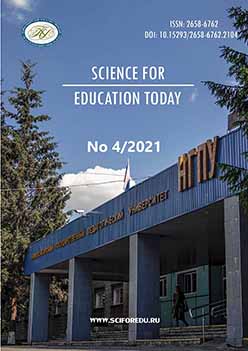Особенности формирования и оценки математической грамотности школьников
Peculiarities of formation and assessment of schoolchildren’s mathematical literacy
Author(s): Larisa Olegovna Denischeva, Natalya Viktorovna Savintseva, Ildar Sufiyanovich Safuanov, Andrei Vladimirovich Ushakov, Vladimir Arkadevich Chugunov, Yulia Aleksandrovna SemenyachenkoSubject(s): School education, Pedagogy
Published by: Новосибирский государственный педагогический университет
Keywords: Mathematical literacy; Contextual tasks; Mathematical models; Model schemes; Problem situation; Problem approach; content lines of mathematics; Mathematical modeling;
Summary/Abstract: The study investigates the problem of developing mathematical literacy. The purpose of the article is to reveal the specifics of developing and assessing schoolchildren’s mathematical literacy. Materials and Methods. The research is based on the concept and model of mathematical literacy defined for the OECD Programme for International Student Assessment (PISA). The main research methods include an analysis of mathematics teachers’ experiences and an analysis of the structure of mathematical literacy tasks. Results. The article presents an analysis of the conceptual foundations of developing schoolchildren’s mathematical literacy. The authors identified and structured the characteristic features of the tasks aimed at forming mathematical literacy, described the main approaches to their development, based on the use of model schemes and mathematical modeling. The links between the contexts of real-life situations and the content areas of the school mathematics course were traced. The complete process of working with mathematical models is illustrated by tasks arising in life situations. The authors revealed the main approaches to the development of tasks, designed to form mathematical literacy, based on the model schemes and the process of mathematical modeling. Conclusions. In conclusion, the authors summarize stages of designing mathematical literacy tasks and the requirements to the approaches of their development. The conclusion is made about the possibility of using model schemes as a reference for mathematical literacy tasks.
Journal: Science for Education Today
- Issue Year: 11/2021
- Issue No: 4
- Page Range: 113-135
- Page Count: 23
- Language: Russian

